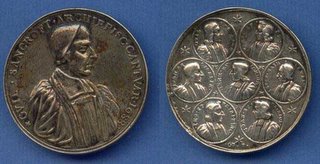Last September, Fr. Thomas Hopko
delivered remarks at the Woodstock Forum, in which he rendered his terms of reunion to Rome. The title of this entry should give you a good idea of his general conclusions.
However, of foremost interest to this blog is that Fr. Thomas -- of the
OCA -- endorses the concept of a Western Rite,
potentially even in Latin. He suggested an Orthodox Pope "would restore the practice of having the priestly celebrant
in the Latin liturgy face the altar with the faithful during the prayers and eucharistic offerings." Accepting the Western Rite would be a good place for all Orthodoxy to begin any outreach to the West, and Fr. Hopko takes this for granted. Further, "the Latin liturgy" is understood in the West as referring to the traditional
Liturgy of St. Gregory, the Latin Mass, "the most beautiful thing this side of Heaven." This is another nod that the
Western Rite has gotten this right.* Acknowledging the right of the West to use either the vernacular or ecclesiastical Latin would give the reunited papacy the same rights every autonomous Orthodox Church enjoys. (Converts are told Orthodox only use the vernacular, but this has frequently not been the case: ask yourself how many Byzantines understand Church Slavonic.) He further recommends the public recitation of the hours in Church -- something more commonly found in the Western Rite than among many of our North American Byzantine brethren. (The OCA churches I've encountered seem to make it a rule
never to recite Orthros on Sunday mornings.) The mere acceptance of the Western Rite would be a major step forward from some in his jurisdiction who utterly reject the concept.
So far, so good. Then his analysis begins to differ markedly from most other Orthodox theologians, particularly Bp. Kallistos Ware. Naturally, he assumes the Pope will embrace the Orthodox faith and renounce Papal infallibility and universal jurisdiction, and various other doctrines. Then come the oddities and exaggerations.
Fr. Hopko essentially demands the Pope accept Byzantinization of the minor issues but not the majors. For instance, he says an Orthodox Pope "would also consider enforcing the ancient ascetical and penitential practice of forbidding the celebration of the Holy Eucharist in Christian churches on weekdays of Great Lent. " This is an ancient custom -- of the East, not the West. The Western Rite and traditionalist Roman Catholics maintain the traditional
missa praesanctificatorum of Good Friday, but every weekday in Lent?
He also instructs the ByzPope to "forbid private eucharistic celebrations for particular intentions, and for particular pietistic, political or ideological purposes."
He passes on to the differences between Eastern and Western Trinitarian approach. Orthodox teach one should begin by teaching about the Three Divine Persons (with Whom one can have a relationship), then declaring the Unity, rather than the unitary Substance/Essence -- and their arguments are persuasive (though
not all Byzantines followed this method). But Fr. Hopko deems the Western Trinitarian approach "unacceptable 'modalism.'" Putting it mildly, this is unacceptable overstatement, and negative hyperbole is not known to help honest dialogue.
Interestingly, he allows "unleavened wafers may be used for pastoral reasons in the churches with this practice, but the pope would affirm leavened bread as normative for the Christian Eucharist." He also permits the use of the
filioque, if properly explained (i.e., that the Spirit proceeds
from the Father
through the Son). Whatever the merits of the proposal, his allowance is unusual for a man so concerned the Pope ban Lenten weekday Masses. The North American Orthodox-Catholic Theological Consultation
recommended in 2003:
that the Catholic Church, as a consequence of the normative and irrevocable dogmatic value of the Creed of 381, use the original Greek text alone in making translations of that Creed for catechetical and liturgical use.
Fr. Hopko moves on to the ratification of the Papacy by other patriarchs, essentially giving the rest of the Church a veto over the See of Rome. He states, "because of his church's unique position among the churches, and his position in the world, [the Pope] may have to be affirmed in some way by the patriarchs and the primates of autocephalous (i.e. self-governing) archbishoprics and metropolias."
Finally, I'm not sure what he meant by this: "On undecided doctrinal and moral issues the Pope of Rome would use his presidential authority to insure that everyone -- clergyman or layperson -- would be encouraged to freely present his or her arguments concerning Christian teaching and practice as witnessed in the Church's formal testimonies to Christian faith and life." So the pope will be going door-to-door in search of theological insights? Perhaps he could begin with the blogosphere! Watch this spot for tomorrow's papal encyclicals.
In all seriousness, other theologians have approached the concept of reunion and reached more practical conclusions on these issues. However, this blog is merely satisfied Fr. Thomas Hopko has endorsed the idea of an Orthodox Western Rite.
We hope he will pitch
that at the next OCA convention; that kind of offer would produce some takers.
* The Liturgy of St. Tikhon doesn't fit into his remarks, as they are directed to the Pope. But I humbly think we did pretty well on that front, too.


